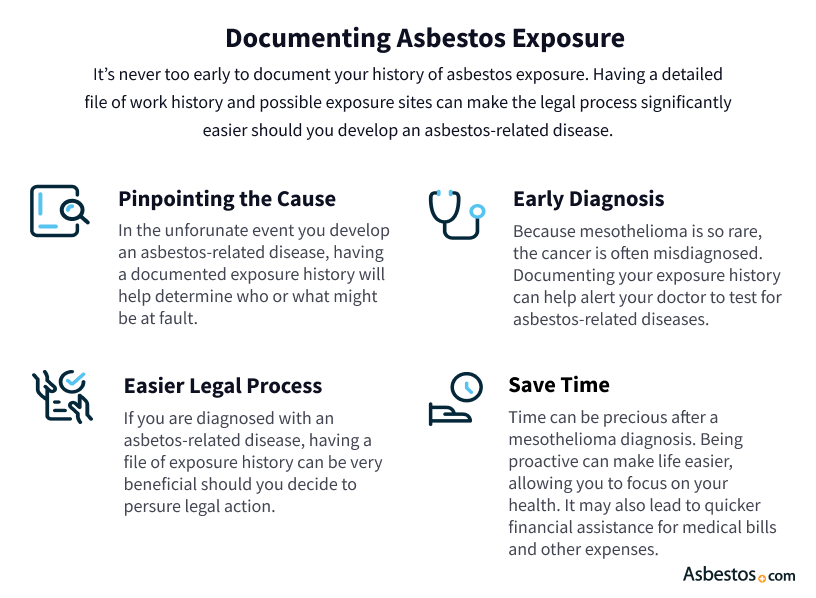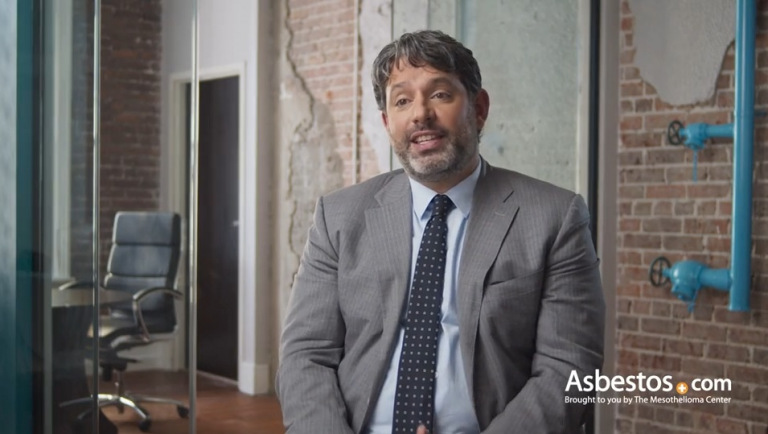Asbestos Claims After Death
Loved ones can file a mesothelioma claim after death to seek compensation through a wrongful death lawsuit or trust fund. Successful claims hold negligent companies accountable and help families. The average asbestos settlement ranges from $1 million to $2 million.
Filing an Asbestos Claim After Death of Loved One
An asbestos claim after death, or a wrongful death claim, allows the family to seek compensation for a loved one’s asbestos-related death. Asbestos claims or lawsuits let families hold manufacturers accountable for a loved one’s death from asbestos exposure.
Usually, living patients file a personal injury claim or an asbestos trust fund claim on their behalf. The plaintiff, or patient, is usually the key witness against the defendants.
- Family members who lost a loved one to asbestos cancer can file a wrongful death claim.
- Average wrongful death settlements for mesothelioma ranged from $1 million to $2 million and jury verdicts averaged $10.6 million between 2021 and 2022.
- Eligibility to file varies in each state. Often surviving spouses, children, parents, grandparents and others meet the criteria.
- Deadlines limit when loved ones may file claims. Asbestos attorneys can review your eligibility.
After the patient dies, they can’t prove their exposure history. Also, they can’t find witnesses to their asbestos exposure. That’s one of the reasons why navigating an asbestos claim after a patient’s death is complex.
However, that doesn’t mean family members of a deceased loved one can’t file an asbestos claim such as a mesothelioma lawsuit. An experienced mesothelioma lawyer can best advise the family and estate about legal options.
Types of Asbestos Claims After Death
The different types of asbestos claims after the death of a loved one diagnosed with mesothelioma or another asbestos-related disease include wrongful death lawsuits, settlements and claims against an asbestos trust fund.
- Wrongful Death Claim: This is a legal action claiming negligent manufacturers and companies are liable for asbestos exposure that led to someone’s death.
- Settlement: After an asbestos lawsuit is filed against an asbestos company, that company will pay a sum to resolve or settle the asbestos claim.
- Trust Fund Claim: Asbestos manufacturers may create these accounts as part of a bankruptcy protection plan to manage active and future asbestos lawsuits. Claimants can file claims with more than one asbestos trust fund to get compensation.
A mesothelioma lawyer can best explain the differences between each of these types of claims and recommend what’s best for your family.
Who Is Eligible to File an Asbestos Claim After Death?
If an asbestos-related illness causes a death, the family may file a wrongful death claim on behalf of the estate. Each state has different rules on who can file a wrongful death claim. Generally, it must be someone close to the deceased, not an estranged family member or acquaintance. It may also include life partners in some states.
- Spouse or life partner
- Children, including adopted children or stepchildren
- Parents or grandparents
- Someone financially dependent on the deceased (this varies by state)
A wrongful death lawsuit can help families pay debts from medical bills, funeral costs and lost income. Mesothelioma compensation may offer hope to families in financial need.
In 2021, a Wisconsin jury awarded $26.5 million to a widow whose husband died of mesothelioma in 2018. Her husband, Gerald Lorbiecki, worked at Wisconsin Electric and Pabst’s Milwaukee brewery. He was exposed to asbestos on the job. After his wife filed an asbestos claim, Wisconsin Electric settled before trial.
Use our calculator to quickly understand what compensation you may be eligible for and understand your rights — all at no cost to you.

How Does an Asbestos Claim Change if a Claimant Dies?
If a mesothelioma plaintiff dies before their claim resolves, an estate representative can continue it as a wrongful death suit. Any compensation from the claim will go to the estate, not the estate rep. You can then divide the payment, as a will divides an estate among family.
In a mesothelioma wrongful death case, damages are often less than if the plaintiff had been alive to sue. The court presumes that a living plaintiff has ongoing expenses. They’ll also be dealing with emotional distress. If the plaintiff dies, those parts of the claim no longer apply.
The loss of the original plaintiff can affect compensation. Because they can no longer attest to their history of asbestos exposure, it may be harder to confirm workplaces, find witnesses and get medical records.
Estate Representatives Manage Claims
If a mesothelioma patient dies during a lawsuit, their claim goes to their estate. The estate representative manages the claim and all decisions on the plaintiff’s behalf.
- The decedent names a family member or friend to represent their estate.
- The court appoints the estate’s representative if the decedent did not name someone before death.
For example, Nicholas Barone got mesothelioma from contaminated talc in plastics and died. Barone’s widow and her lawyer represented her husband’s estate in the case against companies that used asbestos products and the manufacturers. In May 2024, a jury awarded Barone’s family $15 million.
How to File a Wrongful Death Claim for Mesothelioma
It’s essential to seek the advice of an expert mesothelioma attorney when filing a wrongful death claim for mesothelioma. A skilled mesothelioma lawyer knows which firms used asbestos. They can research the best strategy for your case.
All mesothelioma claims need skilled handling. They require knowledge and experience. It’s crucial to have expertise to build a case. This is needed when a patient cannot testify or detail their exposure.
- Find an Attorney: Choosing a mesothelioma attorney is vital. It’s the first step in filing a wrongful death claim. The top mesothelioma firms offer free consultations and case reviews.
- File the Claim: An asbestos law firm can determine the best state in which to file your claim. For example, if the deceased worked in multiple states, the family may not limit a claim to their last or longest residence.
- Discovery Period: Your attorney will research using investigators. They will interview people who knew and worked with your loved one. They’ll help you find witnesses who can testify about possible asbestos exposure. They’ll also obtain medical records.
- Defendant Responses: The defendants in the lawsuit will have time to respond to the claim. They may ask to conduct interviews or depositions. Your attorney will guide you through every step.
- Resolution of Claim: Like personal injury claims wrongful death suits usually end with a trial verdict or a settlement. Mesothelioma settlements are usually quicker than trial payouts. Trials can take months to years.
In some states, companies are liable for secondhand asbestos exposure. Asbestos fibers are microscopic and can travel on clothes, shoes, hair or skin. Someone who worked with the mineral may have exposed others to asbestos.
Firefighters, construction workers, electricians and auto mechanics are the types of jobs where workers may have brought asbestos fibers home with them. A lawyer can help determine if a secondhand exposure claim is possible in a wrongful death case.
In April 2024, a jury in Illinois awarded $45 million to the family of a woman who died of mesothelioma. Family members of Theresa Garcia filed a wrongful death lawsuit against Johnson & Johnson. Plaintiffs claimed J&J’s talc-based baby powder contained asbestos. Her family says Garcia used the product on a regular basis.

Get help finding a top attorney who can get you the compensation you deserve.
Get Help NowCompensation Available Through Asbestos Claims After Death
Families of those who died of mesothelioma can get compensation through multiple legal claims, such as wrongful death lawsuits and asbestos trust funds. These types of claims help pay for expenses incurred by the family or patient.
- Funeral costs
- Pain and suffering
- Loss of wages
- Loss of care
- End-of-life costs
- Outstanding costs from treatment
Compensation may also help cover expenses incurred from travel to hospitals and hotel stays. A mesothelioma attorney can help you outline the types of compensation your loved one’s family may be entitled to.
Average Payouts
Average mesothelioma compensation ranges from $1 million to $20.7 million, according to the 2024 Mealey’s Litigation Report.
- More than $17.5 billion in total payouts by mesothelioma trust funds
- $1 million to $2 million range for the average settlement
- $20.7 million is the average lawsuit trial verdict
In some cases, survivors of a person who died from an asbestos-related illness may be eligible for compensation from many legal options. Financial compensation varies for each case.
Factors Affecting Compensation
There are several factors that may affect the amount of compensation you receive from your mesothelioma case.
- Age
- Asbestos products to which you were exposed
- Evidence against the companies you are suing
- Eyewitness testimony of your asbestos exposure
- Lost wages
- Marital status
- Medical expenses
- Medical history
- Number of dependents
- Occupational history
- Other related expenses
- Stage and severity of your diagnosis
- Type of diagnosis
- Where you file your claim
Your type of claim and its variables will also affect the value of your case. You can file lawsuits and trust fund claims at different times or at the same time. Filing for both may increase your case value. An experienced mesothelioma lawyer will be able to determine if you can seek compensation.
Why File an Asbestos Claim Before the Death of a Loved One
The main benefit of filing an asbestos claim before a loved one’s death is to better prepare the case with a detailed asbestos history. A family member, like a spouse or child, might know some of a loved one’s work history. But no one likely knows more than the person with the disease. The sooner you start documenting, the better.
Mesothelioma treatments also may negatively impact a patient’s abilities. Chemotherapy, for example, can affect memory. This will make it harder for patients to testify or recall their work history.
Preparing can save time if a family member receives a diagnosis of an asbestos-related disease. Mesothelioma lawyers we’ve interviewed say to create a file with a detailed work history and useful contacts. This can help an attorney build the strongest case in a short amount of time.
Legal Requirements for Filing Asbestos Claims After Death
State laws affect who can file wrongful death cases. They also affect when they can and the evidence needed. Research shows that Maine’s new wrongful death law, effective 2024, expands the time to file lawsuits from 2 to 3 years. It also raises the damages cap each year based on inflation.
Asbestos-related diseases take 5 to 6 decades to show symptoms. So, they often wait a long time before doctors diagnose them. In asbestos cases, these latency periods limit time to file lawsuits. This affects claimants and their families.
In the unfortunate situation when somebody passes away before they’re ever able to speak with a lawyer, it doesn’t mean that the family of that person that passed away can’t pursue their legal rights. You have a certain amount of time to file a wrongful death action, and it depends upon what jurisdiction you’re in.
The statutes of limitations for mesothelioma lawsuits vary by state. So the time you have to file depends on where you file your claim. The time limit is usually 1 to 3 years from diagnosis or the death caused by asbestos disease.
These rules require expertise in asbestos litigation and its changing regulations. You must also know key exceptions that may apply to individual cases. Mesothelioma lawyers know these laws and their effects on you.
How to Document Asbestos Exposure
It’s never too early to document a history of asbestos exposure. This is true even before doctors diagnose an asbestos-related disease. If you suspect a loved one was exposed to asbestos, document their work history. Include the dates spent at each job and the location of the job.
Write down the specifics of the jobs worked. Include tasks they performed and machinery they worked with. List co-workers who worked with your family member. They may be witnesses in the case. If a parent or relative worked with asbestos, note their work history. Secondhand exposure is a concern.

Common Questions About Filing an Asbestos Claim After Death
- Can you file an asbestos claim after someone dies?
-
Yes, you can generally file a wrongful death mesothelioma lawsuit or file a claim against the asbestos trusts after someone dies.
Answered By: Carl Money, Mesothelioma Attorney, Nemeroff Law Firm
- What is the process for filing an asbestos wrongful death lawsuit?
-
It is best to hire an attorney specializing in asbestos litigation and allow them to pursue litigation against the asbestos companies and file claims against the asbestos trusts.
Answered By: Carl Money, Mesothelioma Attorney, Nemeroff Law Firm
- What expenses can compensation from a claim filed after death cover?
-
Compensation from a claim filed after death can cover any expenses.
Answered By: Carl Money, Mesothelioma Attorney, Nemeroff Law Firm
- How are wrongful death benefits paid out?
-
Wrongful death settlements with asbestos companies are paid to the heirs when the lawsuit is settled with each asbestos defendant.
Answered By: Carl Money, Mesothelioma Attorney, Nemeroff Law Firm
- Is compensation from a wrongful death verdict or settlement taxable?
-
Generally, compensation from a wrongful death lawsuit verdict or asbestos trust settlement is not taxable.
Answered By: Carl Money, Mesothelioma Attorney, Nemeroff Law Firm






